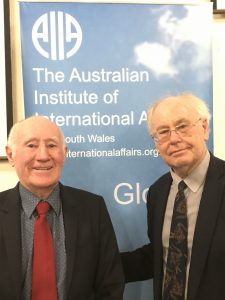50 Years of the ADB in Asia: Lessons for Australian Policy
At Glover Cottages on Tuesday 3 October, Dr Peter McCawley, Visiting Fellow in the Indonesian Project, ANU, shared his insights about the Asian Development Bank (ADB) and its work in transforming Asia over the past five decades.
Peter said that since its inception in 1966 the ADB has functioned as a multilateral development bank. Its basic doctrine is collective economic development. Given the rather underwhelming conditions in Asia in the 1950s and early 1960s, the ADB tried to facilitate development through maintaining peace and security and implementing sound policies, a challenging agenda given that the region was largely defined by poverty, insecurity and uncertainty. A regional effort towards promoting change and moving towards modernisation saw not only an acceleration in the pace of development in Asia, but also a drastic change in the nature of the bank. Within traditionally insular regions – the People’s Republic of China, Southeast Asia and South Asia – living standards surprisingly improved in a way that had never been seen in the developing world. North Korea had yet to show such improvements, but even it seems to be taking hesitant steps towards a market economy. Dr McCawley emphasized that the bank’s multilateral dimension has remained consistently strong and it has attracted and retained members from across the Asian and Pacific region as well as North America and Europe.

Bob Howard & Peter McCawley
Given steady economic growth across the region, Dr McCawley advocated that Australia should get more involved. It could do so in three ways: it could give greater priority to capital investment within the Asian region. Investment in Asian bond markets and infrastructure would not only facilitate development in the Asian markets but also benefit the Australian economy. Second, Australia should place greater emphasis on supporting the development of countries in the Asian region. Contrary to popular belief, our policies do not extend further than humanitarianism when it comes to development. Third, Australia must support regionalism and become less fixated on bilateralism.
Report by Maneesha Gopalan
AIIA NSW Intern